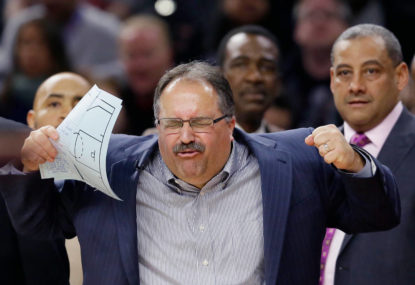LISTEN: Journalist under fire for 'gross... creepy' interaction with Caitlin Clark
https://twitter.com/KatieMox/status/1780695947481174464 https://twitter.com/CWilliamson44/status/1780696642917994703

I had the privilege of attending an NBA match at Madison Square Garden between the New York Knicks and Sacramento Kings. The Knicks haven’t been at their best this year, and on this night they lost 88-80. I was, however, thoroughly entertained.
American sport is all about audience participation. Apart from the half time cheerleader-operated, shirt-firing, cannon, the thing that struck me most was the institutionalised booing of opposition plays or specific players.
Surely the idea of sport these days is viewer and attendee engagement, be that through merchandise, TV rights and at venue atmosphere. While we must remember venues and teams are businesses looking for profit, all the entertainment and stimulation on offer at Madison Square Garden (the self-proclaimed ‘Most Famous Arena in the World’) was geared towards children’s participation, fun, activity and basic enjoyment for everyone.
But intermixed with this overarching theme was the actual basketball game that was peppered with the almost-institutional booing of some players and any opposition player at the free-throw line.
This intrigued me because it didn’t matter how unimportant the resulting foul and then free throw was, the home teams fans objected to it. I feel in Australia we tend to only boo if we really believe foul play has occurred or that an opposing team has benefitted from an incorrect ruling or play resulting in points.
Of course, booing is not solely an American issue; in Australia we have that larrikin spirit which hates authority so we tend to give the umpires, referees and adjudicators more stick than anyone else. Increased booing can also be correlated to one’s level of intoxication, which I think again is not solely an Australian problem.
However, some politicians may disagree.
The differences across sports and countries are quite interesting. For instance, I can say I’m often offended when I hear booing of penalty goal attempts in South Africa during rugby. This seems to be absolutely acceptable over there. I know it happens in Australia and New Zealand also but is more sporadic or specific to certain match rivalries. In the UK booing during a kick in a rugby Test match is close to a sin. Silence most often ensues, unless you can find an excuse to stay loud.
The NBA game I attended, and in other American sporting contests I’ve watched, booing an opponent was as normal and common as the chant of ‘defence’ every time the other team had the ball.
If sport is meant to be a way for modern society to play out its competitiveness in an inclusive and enjoyable context, then how does the negativity of booing fit in?
I think booing has a time and a place. I certainly won’t sit here and say I haven’t done it, nor will I say I didn’t enjoy it. Crowd behaviour and audience interaction have become intertwined enough that in Australia; clubs, leagues and other sporting groups have become responsible for the unruly few. I don’t believe the idea of booing itself is unruly, but it can often be the beginning of such behaviour.
In America booing is much more ingrained as an acceptable behaviour of sporting event attendance and team support. Which is fine with me as long the message remains one of sporting rivalry, tradition and camaraderie as opposed to negativity, anger and hatred.
Boo to that I say!